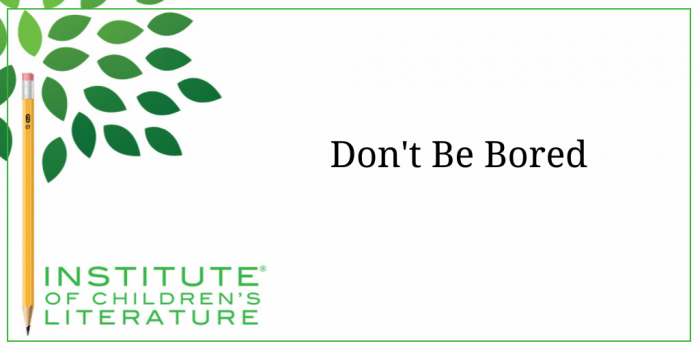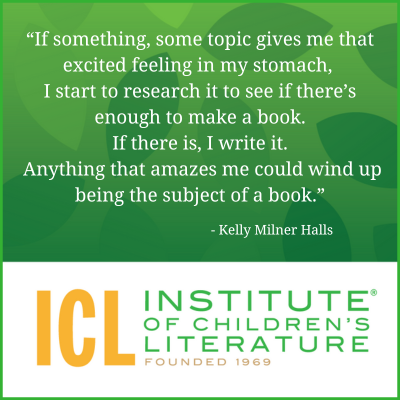1000 N. West Street #1200, Wilmington, DE 19801
© 2024 Direct Learning Systems, Inc. All rights reserved.

I picked Kelly Milner Halls’ quote about her excitement at finding new weird topics to write about, because I think it’s key to nonfiction writing.
It’s key to fiction writing.
It’s key to writing.
If you’re not excited by the thing you’re writing, you’ll never get the reader to be excited about it. And if you truly find the topic thrilling, you can stir up interest in topics kids never thought to wonder about.

Last year I was asked to do school visits about research and sources. On the surface, that doesn’t sound like a very interesting subject. Basically, I was asked to help the kids write better reports. I almost despaired at the very thought. Then I remembered something:
I actually love doing research.
I truly do. I also really enjoy evaluating sources. I love thinking about things, digging for nuance, getting a clearer view. I like doing that. I know not everyone does, but it plays right into my basic need to be nosy. And once I let myself relax and love the topic, I was able to approach the school visit in a totally different way. I was able to tap into what I love about the topic and find a way to make it exciting and fun for the kids as well. They were engaged and attentive throughout my talk and quick to respond every time I asked them questions. They loved this boring topic, because I refused to be bored.
Since the bulk of the writing I do is work assigned to me, I don’t always get to choose my topic. Now, I can always pass on a topic that truly does not interest me. I can always turn down work. They might not ever ask me again, but it’s always an option to pass. But usually, if I spend a little time poking at the topic they suggest, I can find something that interests me. Then I can find something that fascinates me. Then I’m off to the races on crafting a piece that’s engaging and exciting for the reader as well. The key is to move past any negative first impression I might have about the topic and begin digging until I find the treasure hidden within. And to do that, I have to refuse to be bored.
I handle fiction and nonfiction that same way. I write a lot of cozy mysteries for adults. By definition, a cozy mystery works within certain constraints. The publisher I write for imposes still more rules that I must work within. And I’ve written a lot of these books, dozens in fact. It would be easy to begin to be bored by them. And yet. My being bored is a choice I make, not something built into the job. If I give in to boredom, that’s my failure, not a failure of the task at hand. I once met a feisty grandma who said, “Only boring people get bored.” I choose never to be boring, so I make that effort to approach every book in a new way with a different outlook or by turning something expected into something unexpected. I look for ways not to be bored.

There are books I just couldn’t read. They’re too far outside my skill set and experience, and I just cannot follow the information in them. I’d love to read more about theoretical physics, but when it gets way over my head, it’s just “blah, blah, blah.” That’s when I get bored. So if you want to avoid having your writing be boring, keep your reader’s ability in mind. Are the concepts you’re including in your nonfiction way outside their experience? If so, are you giving them a road in to understand? And in fiction, are you relying too heavily on things of value or interest to adults and not thinking about the things that matter most to the reader?
I had an instructor in college who taught abnormal psychology. Surely no topic would could possibly be more interesting than abnormal psychology, at least that’s what I thought. I was eager to take the class. I was passionate about the topic. But the instructor was not. He was teaching the topic because it was required of him in order to get research money. He had zero enthusiasm or passion for teaching the subject. And it’s the only course where I actually fell asleep in class once. Even the most fantastic topic can be ruined by a bored presenter–or writer. You must find a way to care, and care deeply, for your work if you want to be good. You just do.
There are children’s books that my daughter loved when she was little. For some, it was mostly because she loved the licensed characters reflected in the books. But sometimes, well, they were wordy and stilted and just hard to read out loud. And (as an adult) the presence of a Disney princess in the story simply wasn’t enough. So I would read the books because my daughter loved them, but they hurt my brain every time because there was nothing in them for me to hang my enthusiasm on. Sometimes we don’t take into account what the reader already knows or has already experienced too many times when writing a book or article. We spend too long explaining concepts the reader has had explained to them in school many, many times. This is another reason why it helps to think about what the reader is likely to know. It not only keeps the piece from being boring because it’s too outside of the reader’s experience, but also keeps you from rehashing information that is old news for the reader. (This is another tough thing about series books. You can quickly bore a reader by explaining things already presented in all the other books, but you still need to make sure the book works for someone entering the series with this book. So how do you do both? Think about how to make the “old news” information interesting and exciting for you. If you can do that, you’ll probably make it work for the reader too.)
Many readers of the newsletter and this blog are taking an Institute of Children’s Literature writing course, and I’ve heard the grumbling about writing nonfiction a few times. Sometimes writers don’t want to do it. It’s not what they want to write for their career. They wrote too many reports in school. It’s boring. But the reality is that it doesn’t have to be. I love writing fiction and built most of my career on fiction. But nonfiction is a license to be nosy. It’s your chance to dig into something that interests you. And if you let your little kid’s curiosity out to play, you just might find out it’s every bit as much fun as fiction.
Writing isn’t boring. Research isn’t boring. But writers can be. So, refuse to be boring. Refuse to be bored. You’ll be a better writer for it.
With over 100 books in publication, Jan Fields writes both chapter books for children and mystery novels for adults. She’s also known for a variety of experiences teaching writing, from one session SCBWI events to lengthier Highlights Foundation workshops to these blog posts for the Institute of Children’s Literature. As a former ICL instructor, Jan enjoys equipping writers for success in whatever way she can.
1000 N. West Street #1200, Wilmington, DE 19801
© 2024 Direct Learning Systems, Inc. All rights reserved.
1000 N. West Street #1200, Wilmington, DE 19801
© 2024 Direct Learning Systems, Inc. All rights reserved.
1000 N. West Street #1200, Wilmington, DE 19801
© 2024 Direct Learning Systems, Inc. All rights reserved.

1000 N. West Street #1200, Wilmington, DE 19801
© 2025 Direct Learning Systems, Inc. All rights reserved.

1000 N. West Street #1200, Wilmington, DE 19801
©2025 Direct Learning Systems, Inc. All rights reserved. Privacy Policy.